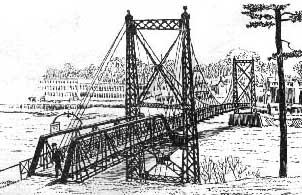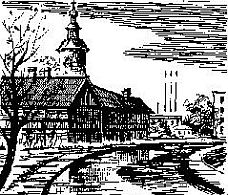 |
Kotlas - Waterville Area Sister City Connection P.O. Box 1747 Waterville, ME 04903-1747 Write to Us |
 |
 |
Kotlas - Waterville Area Sister City Connection P.O. Box 1747 Waterville, ME 04903-1747 Write to Us |
 |
|
Home > About Kotlas > History > Gulag > Polish Exiles In Exile In KotlasHundreds of Poles Who Passed Through Siberian Camps and Exile Have Formed the "Union of Siberyaks"After the publication in the Warsaw biweekly Polityka (No. 3 from Jan. 18, 1992) of an article by Kazimierz Zybert about the Kotlas organization Sovest, we began to receive letters from those who had "passed through Kotlas" during the 1940's. From Warsaw, Wroclaw, Poznan, Bydgoszcz, Szczescin, Kamen, Pomorski, and other cities. People write about how, after the signing of the Molotov-Ribbentrop Pact, they were arrested by the NKVD and sent in freight cars into the depth of Russia and to Siberia. [In August 1919, Germany and the Soviet Union signed a non-aggression treaty, the Molotov-Ribbentrop Pact, in which they pledged not to attack each other at to divide Poland between them. In September, countries invaded Poland. Deportations to Northern Russia and Siberia of Poles from the Soviet zone began soon afterwards.] Some of the letters are short. In them are listed the names of the members of the writer's family who were subjected to repression and a request for help in getting an affidavit from the archives to confirm that they were exiled in the Archangel, Kirov, or Vologda Regions or in the Republic of Komi after 1940. Others, letters which pour out the soul of their writers, give pictures of the life and sufferings of these people thousands of miles from their homeland. Maria Z., WarsawOn June 30, on our wedding night, the Cheka [the security police, a forerunner of the KGB] broke into our apartment in Lvov [now in Ukraine] and took us to police headquarters. After checking our documents and writing down additional information, they took all those who were rounded up there to the railroad station and loaded us into freight cars. For about three weeks this train made its way across the USSR and finally arrived in Kotlas. They assigned us to the Limenda Timber Enterprise, to an area in the Northern Kalchug part of the Kotlas Region, where the commandant was the Cheka officer Dolgopolov. We worked as loggers in very difficult circumstances. In August of 1941 my husband fell ill with tick-born encephalitis. They amputated his hands and feet [or perhaps arms and legs, the Russian is ambiguous on this]. My husband's condition was very grave, and there wasn't any kind of medicine. When everybody prepared to depart we found ourselves in an impossible situation: my husband was lying immobilized and I was pregnant. I managed to find a cart and to transport my husband to Kotlas and place him in a hospital. Conditions there at that time were terrible. Our route home lay through the city of Leninsk near Stalingrad, where our son was born on March 14, 1942. My husband, since the age of 25 until the present day, has been an invalid of the first group. Kazimierz M., WroclawThey took our family from Tarnopl on February 10, 1940. For three weeks we traveled to the Komi Republic. There were five of us: my parents, my mother's seventeen-year-old brother, my five year old brother, and I, who was seven. My mother's brother Wlodimierz, died in exile. My father went to the front in 1941 and perished in 1944. My mother fell seriously ill and lay for a long time in a hospital. My brother and I were left without any one to look after us and were put into an orphanage in the village of Oparino near to Kotlas. We returned to Poland in March 1946, together with other orphans. Zdislaw T., PoznanThe NKVD deported us to the USSR on June 20, 1941 from the town of Zaremba Kostelna, 100 kilometers [60 mi.] from Warsaw, near the Molotov-Ribbentrop border [the Vistula River]. We were taken by rail in freight cars, under the bayonets of Red Army soldiers, to Kotlas in the beginning of August 1941. From there they sent us out to different places by barge. They dumped us in the village of Sobin. My family consisted of my mother and three children: Marian, who was 11 years old; three-year-old Miroslaw; and I, Zdislaw, who was six. I remember big snows, heavy frosts. To me the Vychegda River was "a great water". I remember river boats, plank roads in the taiga, long wooden barracks. I remember people who died from hunger and cold. I remember how we cried over our mother when she was brought in from the forest unconscious. She had been crushed by a tree. My mother worked as a logger; she was a strong, healthy woman. At that time she didn't have even a crust of bread to give to her oldest son for the road when he walked over 40 kilometers to the neighboring settlement for our ration of salt. Kazimierz Z., WarsawI was 15 years old. In June of 1940, my father, my brother Ilya, my sister Irina, and I were brought in a group of 300-400 "special deportees" to the Kotlas District, to the Limenda Timber Enterprise in the settlement of Yagodnoye. There we lived, worked, suffered and awaited liberation. We were brought from Lvov, where we were seized as escapees from Nazi occupation (from that "Warsaw" part of Poland). My mother remained in Warsaw and perished during the war. From May of 1941 we worked in the settlements of Yagodnoye and Northern Kalchug as loggers. There were commandants in charge in the settlements: in Yagodnoye, Grigoriy Makhin; in Northern Kalchug, Dolgopolov. I remember Makhin well: short, round-faced, always in uniform. It was awfully hard to take when he told us that we were here forever. My father, who knew Russian (he had graduated from Russian school), wrote complaints everywhere. He kept petitioning the authorities. Because of this they held our family. For a long time they didn't give us our liberation papers. In 1946 in Uzbekistan and Fergana, I finally got permission to return to my homeland. My father perished in a Tashkent prison, my sister died soon after returning to Poland. (Read about Zybert's attempt to get documentation of his imprisonment.) Mariya Bubnova, city of Koryazhma, in the Kotlas DistrictOur family was deported to the village of Yagodnoye in 1938. My father, Dmitriy Zhelobov, worked as a forester in the Limenda Timber Enterprise from 1934. I well remember how in 1940 they brought the exiled Poles to Yagodnoye. The majority of them were with their families. They placed them in two villages, Northern Kalchug and Yagodnoye. In general these were educated people, many had higher education and even scholarly degrees. They placed them in wooden barracks. Before the Polish deportees, criminals had done the logging, but after the arrival of the Poles they transferred them to a different district. The deportees often fell ill from the labor that was beyond their strengths, from the poor food, and from the overcrowding in the wooden barracks. There were even deaths, especially among the children. They buried them in a cemetery right next to the settlement. I remember the engineer Fride very well; he was one of the Polish Jews and a very clever man. He lived in Yagodnoye alone, without family. Unfortunately Fride died from hunger and exhaustion in the beginning of 1942. I remember a family named Krzywanski, who had five children, all of them girls. Krzywanski worked as a medical attendant, but in fact he was a great scholar-physician, a professor. People came to him for consultations from great distances. he never turned any one down, he helped everyone he could, he even performed operations. From the editors: The settlements of Yagodnoye and Northern Kalchug don't exist today. There is no more Limenda Timber Enterprise with prison logging camps. Only the thousands of unmarked graves all through the Arkhangel Region remind us of the years of "inexhaustible enthusiasm". Oh yes, and the portraits of the great mustachioed Father [presumably Stalin, who had a handlebar mustache], who still looks down from the windows of the lumber trucks onto the domain so trampled by him. by Irina Dubrovina From the magazine Karta, Ryazan, Russia, 1993, No. 1. <— Previous • Top • Intro • Next —> |